
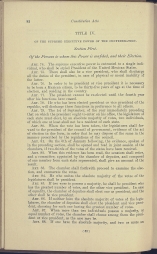
OF THE SUPREME EXECUTIVE POWER OF THE CONFEDERATION.
Of the persons to whom this Power is confided, and their Election.
Article 74. The supreme executive power is entrusted to a single individual, who shall be styled President of the United Mexican States.
Article 75. There shall also be a vice president, who shall discharge all the duties of the president, in case of physical or moral inability of the latter.
Article 76. In order to be president or vice president it is necessary to be born a Mexican citizen, to be thirty-five years of age at the time of election, and residing in the country.
Article 77. The president cannot be re-elected until the fourth year after his functions have ceased.
Article 78. He who has been elected president or vice president of the republic, will discharge these functions in preference to all others.
Article 79. The 1st of September, of the year immediately preceding that on which the new president ought to enter his office, the legislature of each state must elect, by an absolute majority of votes, two individuals, of which one at least shall not be a resident of such a state.
Article 80. When the vote has been taken, the legislatures shall forward to the president of the council of government, evidence of the act of election in due form, in order that he may dispose of the same in the manner prescribed by the regulations of the council.
Article 81. On the 6th of January following, the evidence, spoken of in the preceding section, shall be opened and read in joint session of the chambers, if two-thirds of the votes of the states have been received.
Article 82. When this evidence has been read, the senators shall retire and a committee, appointed by the chamber of deputies, and composed of one member from each state represented, shall give an account of the result.
Article 83. The chamber shall forthwith proceed to examine the election, and enumerate the votes.
Article 84. He who unites the absolute majority of the votes of the legislatures shall be president.
Article 85. If two were to possess a majority, he shall be president who has the greatest number of votes, and the other vice president. In case of equality, the chamber of deputies shall elect one as president, and the other shall be vice president.
Article 86. If neither have the absolute majority of votes of the legislatures, the chamber of deputies shall elect the president and vice president, choosing for each one having the greatest number of votes.
Article 87. When more than two individuals possess a majority, or equal number of votes, the chamber shall choose among them the president or vice president, choosing for each one having the greatest number of votes.
Article 88. If one have the absolute majority, and two or more an equality of votes, but greater than the rest, the chamber shall choose from those having the greatest votes.
Article 89. If all have an equal number of votes, the chamber shall choose a president and vice president from among the whole; as also, when one has a greater number, and the rest an equal number of votes.
Article 90. Should there be a tie, when voting upon the elections of the legislatures, the vote shall be repeated once, and if it still continues to be a tie, chance shall decide.
Article 91. In competitions between two or more, having an equal number of votes, the voting must be directed to reduce the competitors to two or one, in order that the remaining party be placed in competition with him who has the majority of votes.
Article 92. As a general rule, in voting for president and vice president, chance shall not be resorted to till after two votings.
Article 93. In voting on the elections of the legislatures, as well as on the nomination of the president and vice president, the representations of each state shall have but one vote; and in order to have a decision of the chamber, there must be an absolute majority of votes.
Article 94. In order to deliberate on the objects mentioned in the preceding article, there must concur more than one-half of the whole number of members, and three fourths of the deputies of the states.
(Transcription, errors in original preserved)
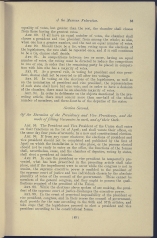
Of the Duration of the Presidency and Vice Presidency, and the mode of filling Vacancies in each, and of their Oath.
Article 95. The President and Vice President of the Union shall enter on their functions on the 1st of April; and shall vacate their offices, on the same day four years afterwards, by a new and constitutional election.
Article 96. If from any cause whatever, the elections of president and vice president should not be completed and published by the first of April on which the installation is to take place, or the persons elected should not be ready to enter on the office, the functions of the former shall, nevertheless, cease, and the chamber of deputies, voting by states, shall elect a president ad interim.
Article 97. In case the president or vice president be temporarily prevented, what has been prescribed in the preceding article shall take place, and if the impediment were to occur while the congress is not in session, the supreme executive power is confided to the president of the supreme court of justice and two individuals chosen by the absolute plurality of votes of the council of the government. These cannot be members of the general congress, and they ought to possess the qualifications required of the president of the Union.
Article 98. While the elections above spoken of are making, the president of the supreme court of justice discharges the executive power.
Article 99. In the event of perpetual impossibility of the president or vice president, congress, and in their recess the council of government, shall provide for the case according to the 96th and 97th articles, and take steps that the legislatures proceed to elect a president and vice president according to the constitutional forms.
Article 100. The election of president and vice president made by the legislatures, in consequence of the perpetual impossibility of those holding these offices, shall not prevent the ordinary elections which take place the first of September every four years.
Article 101. The president and vice president elected every four years, ought to be on the first of April in the place where the supreme powers of the Union reside, and take an oath before he united chambers to fulfil their duties in the following form: I, -------, appointed president (or vice president) of the United Mexican States, swear before God and his holy evangelists, that I will faithfully discharge the office which the United States have entrusted me with, and that I will observe, and cause to be observed, exactly the constitution and the general laws of the confederation.
Article 102. If neither the president nor the vice president present themselves to take the preceding oath, and the session of congress is open, they shall take such oath before the council of government as soon as each presents himself.
Article 103. If the vice president present himself, and take the oath before the president, he shall be at the head of government until the president has taken the oath of office.
Article 104. The president and vice president, constitutionally appointed according to the 99th article, and the individuals provisionally appointed to exercise the functions of president according to the 96th and 97th articles, shall take the oath mentioned in the 101st article, before the chambers if in session, and if not, before the council of the government.
(Transcription, errors in original preserved)
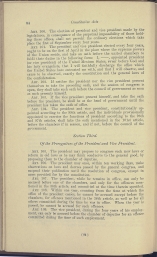
Of the Prerogatives of the President and Vice President.
Article 105. The president may propose to congress such new laws or reform in old laws as he may think conducive to the general good, by proposing them to the chamber of deputies.
Article 106. The president may once, within ten working days, make observations on laws and decrees passed by the general congress, and suspend their publication until the resolution of congress, except in cases provided for by the constitution.
Article 107. The president, while he remains in office, can only be accused before one of the chambers, and only for the offences mentioned in the 38th article, and committed at the time therein specified.
Article 108. Within one year, counting from the time at which the office of the president ceases, he cannot be accused except before the chambers, for offences mentioned in the 38th article, as well as for all others committed during the time he was in office. When the years is passed, he cannot be accused for such offences.
Article 109. The vice president, during the four years of his employment, can only be accused before the chamber of deputies for an offence committed during the time of such employment.
(Transcription, errors in original preserved)
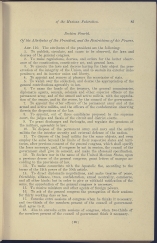
Of the Attributes of the President, and the Restrictions of his Powers.
Article 110. The attributes of the president are the following:
1st. To publish, circulate, and cause to be observed, the laws and decrees of the general congress.
2d. To make regulations, decrees, and orders for the better observance of the constitution, constitutive act, and general laws.
3d. To execute the laws and decrees having for their object the preservation of the integrity of the Union, and to sustain its exterior independence, and its interior union and liberty.
4th. To appoint and remove at pleasure the secretaries of state.
5th. To watch over the collection, and decree the appropriation of the general contributions agreeably to law.
6th. To name the heads of the treasury, the general commissaries, diplomatic agents, consuls, colonels and other superior officers of the permanent army, and of the armed and active militia, with the approbation of the senate, and in the recess, by the council of the government.
7th. To appoint the other officers of the permanent army and of the armed and active militia, and the officers of the confederation observing therein the dispositions of the law.
8th. To appoint, out of three candidates proposed by the supreme court, the judges and fiscals of the circuit and district courts.
9th. To grant discharges and furloughs, and regulate the pensions of the military, agreeably to law.
10th. To dispose of the permanent army and navy and the active militia for the interior security and external defence of the nation.
11th. To dispose of the local militia for the same objects, and even employ the same beyond the limits of their respective states and territories, after previous consent of the general congress, which shall specify the force necessary, and, if congress be not in session, the council of the government shall give its consent, and make the aforesaid specification.
12th. To declare war in the name of the United Mexican States, upon a previous decree of the general congress; grant letters of marque according to the provisions of law.
13th. To make concordats with the Apostolic See, according to the terms of the 12th power of the 50th article.
14th. To direct diplomatic negotiations, and make treaties of peace, friendship, alliance, truce, confederation, armed neutrality, commerce, and all other kinds; but in order to give or withhold ratification of the same, the approbation of the general congress is necessary.
15th. To receive ministers and other agents of foreign powers.
16th. To ask of the general congress the prorogation of their sessions for thirty working days or less.
17th. Convoke extra sessions of congress when he things it necessary, and two-thirds of the members present of the council of government shall agree to it.
18th. Also to convoke extra sessions of congress, when two-thirds of the members present of the council of government think it necessary.
19th. To see that prompt and perfect justice is administered by the supreme court and other tribunals of the Union, and that their decrees be carried into effect, according to law.
20th. To suspend from their employments, for a space not exceeding three months, and deprive of not more than half their salaries for the same period, all persons employed by the Union, who violate his orders or decrees, and, if he thinks such persons should be tried, to send them before the competent tribunals.
21st. To approve or retain decrees of councils, pontificial bulls, letters, and rescripts, with consent of the general congress, consulting the senate, and, in the recess, the council of government, when they treat on subjects peculiar to the administration, and the supreme court, when on subjects of litigation.
Article 111. The president, in publishing the laws and decrees, shall use the following formula: "The President of the United Mexican States makes known to the inhabitants of the Republic, that the General Congress has decreed as follows: [here insert the text]." Wherefore, I order that the same be printed, published, and circulated and carried into effect.
Article 112. The restrictions of the president's powers are the following:
1st. The president cannot command in person the army or navy without the previous consent of the general congress, or, in its recess, the council of government, by a vote of two-thirds of the members present, and when he commands them with such permission, the vice president shall act as president.
2d. The president cannot deprive any one of his liberty, nor impose any punishment; when the welfare and security of the Union requires, he may, however, arrest persons, placing them, within forty-eight hours, at the disposition of competent tribunals.
3d. The president cannot occupy the property of any individual or corporation, nor disturb them in their possession or use of the same; and if in any case it should be necessary for some object of acknowledged utility to take the property of an individual or a corporation, it cannot be done without previous approbation of the senate, and in the recess, the council of government, always indemnifying the party the value fixed by appraisers chosen by himself and the government.
4th. The President cannot impede elections nor the other acts spoken of in the 38th article.
5th. Neither the President nor the Vice President can leave the republic during the time of their office, nor for a year afterwards.
(Transcription, errors in original preserved)
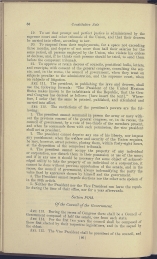
Of the Council of the Government.
Article 113. During the recess of Congress there shall be a Council of Government composed of half the senate, one from each state.
Article 114. For the first two years the council shall be composed of those first elected by their respective legislatures, and in the sequel by the oldest.
Article 115. The Vice President shall be president of the council, and he shall appoint according to his own regulation a president pro tempore to discharge his functions in his absence.
Article 116. The attributes of this council shall be as follows:
1st. To watch over the observance of the constitution and the constitutive act and general laws, keeping a record of all incidents relating to this subject.
2d. To make such observations to the President as they deem useful to the accomplishment of the constitution and laws of the Union.
3d. To require, of their own accord, or at the request of the President, extra sessions of Congress, but in such cases two-thirds of the members present must concur, according to the 17th and 18th power of article 110.
4th. Give their consent for using the local militia, according to the 9th power of article 110.
5th. Approve of the appointments mention in the 6th power of article 110.
6th. Give its consent in the case of article 112, 1st power.
7th. Appoint two individuals, who jointly with the president of the supreme court, shall exercise provisionally the supreme executive power, according to article 97.
8th. To receive the oath of article 101, from the individuals of the supreme executive power, in the cases mentioned in the constitution.
9th. To give their opinion in the consultation with the President, according to the 21st power of article 110, and on other subjects on which he may consult them.
(Transcription, errors in original preserved)
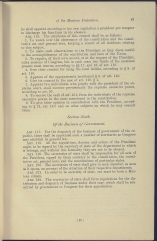
Of the Business of Government.
Article 117. For the despatch of the business of government of the republic, there shall be appointed such a number of secretaries as Congress may establish by general law.
Article 118. All the regulations, decrees and orders of the President ought to be signed by the secretary of state of the department to which it belongs, and without this formality they are not to be obeyed.
Article 119. The secretaries of state shall be responsible for all acts of the President, signed by them contrary to the constitution, the constitutive act, general laws, and the constitutions of particular states.
Article 120. The secretaries of state shall give to each chamber, as soon as it opens, an account of the situation of their respective departments.
Article 121. In order to be secretary of state, one must be born a Mexican citizen.
Article 122. The secretaries of state shall form regulations for the distribution and despatch of business under their care, which shall be submitted by government to Congress for their approbation.
(Transcription, errors in original preserved)

